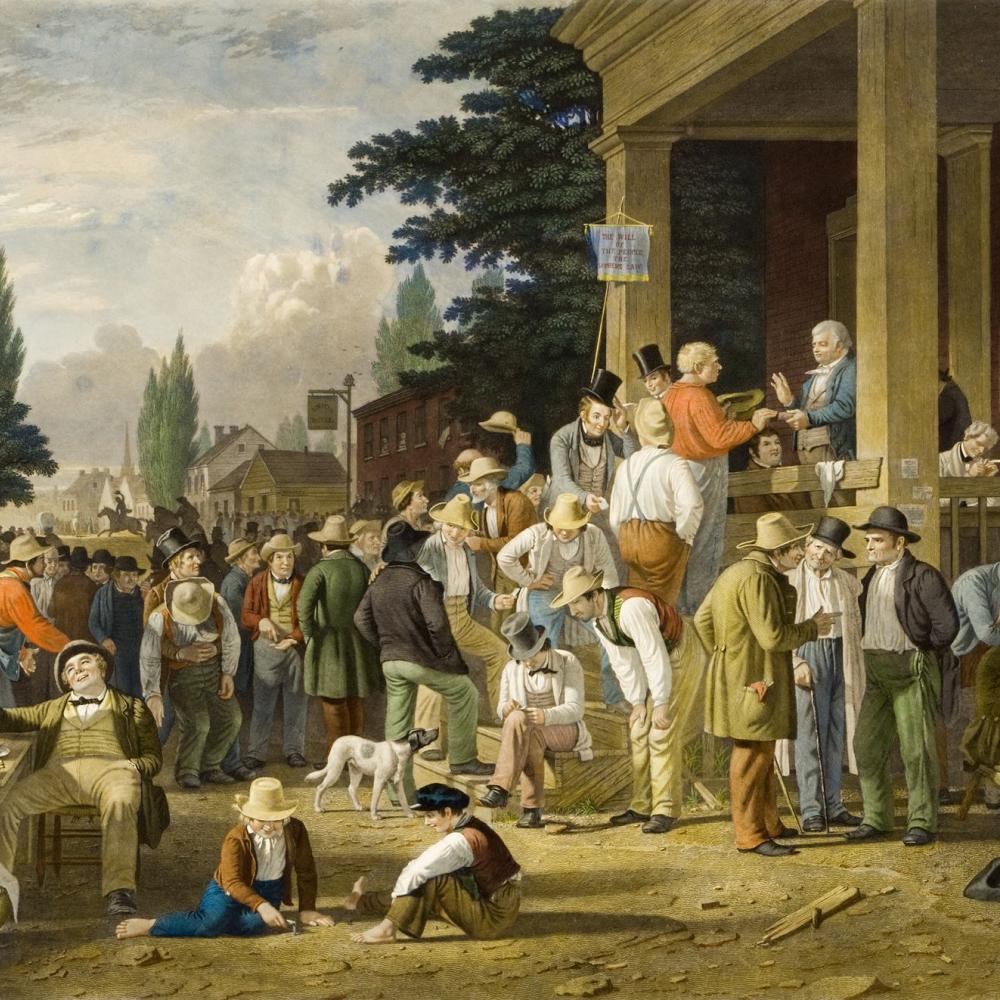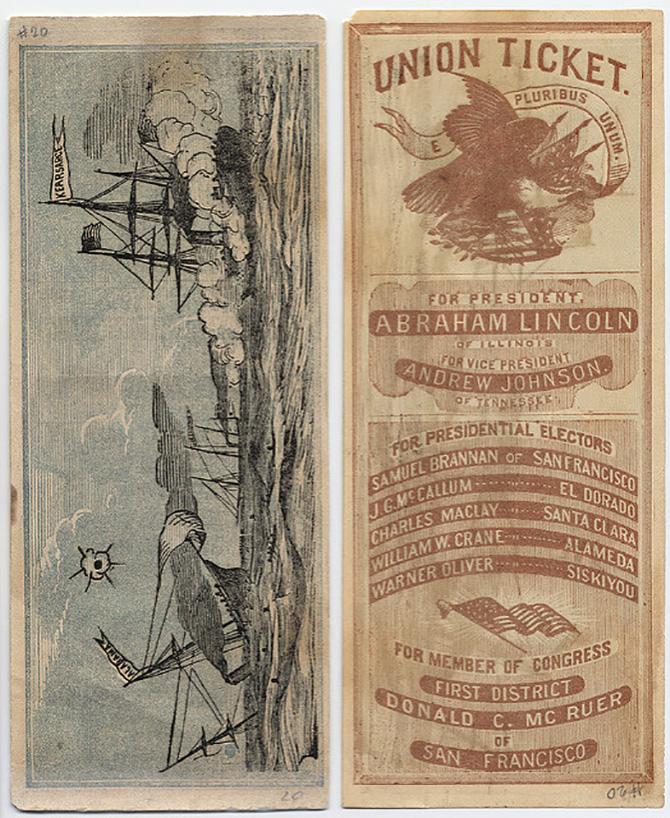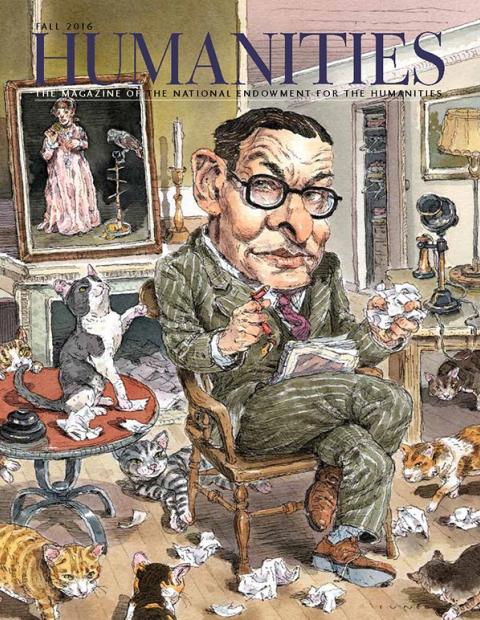What if, in November, instead of disappearing behind a curtain to exercise your right to vote, you had to declare your choices before an audience of your friends and neighbors? Would it change how you voted? Or even stop you from voting at all?
Today the secret ballot is assumed to be a fundamental part of democracy. But for most of America’s history voting was a highly public act. Spectacularly public even, accompanied by boisterous crowds, partisan hecklers, torchlight parades, free-flowing whiskey, and brawling.
From colonial times through the 1880s, votes were cast orally. This method of voting, called viva voce—literally, “with the living voice”—was how George Washington, Thomas Jefferson, and Abraham Lincoln would have voted, and were themselves voted into office.
Citizens assembled at a public polling place and, one by one, ascended a platform where they could be seen and heard by all. After attesting to his eligibility before the election officials, who were safely separated from jostling hordes by an elevated enclosure, each man was required to call out his preferred candidates. A clerk recorded every voter’s name, address, and electoral choices in a poll book, which became a matter of public record.
Even as states moved, in the mid nineteenth century, to a paper-based system, voting remained a public act. Voters deposited paper tickets in a public ballot box, often a glass globe or jar. Printed and distributed by the political parties, the tickets listed the party’s candidates by office and were easily distinguished by color and markings for the benefit of the political operatives who kept tabs on who voted and how.
Not only was there no expectation of privacy for voters, but voting in secret, in the early days of the republic, was considered antithetical to the principles of democracy. The underlying reasons began with the idea that voting, rightly understood, should not be an expression of private interests or beliefs.
“The voter is under an absolute moral obligation to consider the interest of the public, not his private advantage,” wrote John Stuart Mill. The voter should give his support, “to the best of his judgment, exactly as he would be bound to if he were the sole voter, and the election depended upon him alone.” Secret voting, by contrast, suggested a very different meaning, thought Mill and others. It would be like telling the voter he may vote without regard to the public good and “simply as he feels inclined.”
Just as open voting was useful to nineteenth-century party agents, the records it produced are a boon for modern historians and political scientists. Contemporary pollsters rely on voters to truthfully report on anonymous actions behind a curtain. But viva voce poll books tell us exactly which individuals voted, when, and how.
Don DeBats, a political historian at Flinders University in Australia, has spent three decades analyzing nineteenth-century viva voce poll books. Supported by an NEH grant, DeBats compiled voting records from Alexandria, Virginia, in the 1850s and Newport, Kentucky, in the 1870s—the only two cities for which complete viva voce poll books have been recovered—and cross-referenced them with census records, historic maps, city directories, church membership rolls, tax records, and other archival materials to assemble a fine-grained portrait of each city’s residents and their voting (or nonvoting) habits.
The result is the Voting Viva Voce website, which allows us to peek into the political lives of individual households. This online database, sortable by occupation, wealth, marital status, and candidate choice, tells us for example that Francis Weadon, a 45-year-old locksmith and member of Alexandria’s Methodist Episcopal South Church, voted for a straight slate of Democrats, while his next-door neighbor, the 32-year-old grocer J. E. Douglas (a Presbyterian) voted all Opposition. Even more fascinating, the records allow us to compare the inhabitants of two mid nineteenth-century cities on the verge of crisis to see how environment and social networks affected voter choice.
All Politics Is Local
Between 6 a.m. and sundown on Thursday, May 26, 1859, 1,406 white male residents of Alexandria gathered at polling places around the city to cast their votes for a Congressional representative, a Virginia House of Delegates member, the governor, lieutenant governor, and attorney general. They voted outside the city council chambers and the county courthouse, at a private residence downtown, and at the less salubrious Trammels Tavern.
But, for some reason, the city’s richest man, James Green, was not among them. Only a few years earlier, Green (whose name may be known to viewers of PBS’s Mercy Street since DeBats and his research team provided the biographical portraits of Alexandria residents upon which the series is based) had been elected to Alexandria’s Common Council as a Whig. And his name would reappear in the poll books later, in municipal elections of 1860 and 1861. Given Green’s standing in the community, his vote would have been of particular interest to his fellow residents, who were anxious about an impending threat of civil war. And perhaps that was why Green, a savvy businessman, chose to abstain. It may even have been that Green—like his city—was at a crossroads.
Situated along the Potomac River across from Washington, D.C., Alexandria in the 1850s was a bustling commercial port. It shipped Appalachian coal and agricultural produce from the Shenandoah Valley up the eastern seaboard. It was also a U.S. headquarters for the trade in black lives. About a quarter of the city’s population was African American—half slave and half free—and the city depended heavily on both black labor and commercial trade with the North.
Until recently, Alexandria had been reliably aligned with the pro-commerce Whigs against the Democratic party. But the question of whether to permit the expansion of slavery into new territories had fractured the Whig party. Now, with the threat of Southern secession looming, Alexandrians risked having to choose between their two primary economic interests by either siding with the Democrats or casting their lot with the newly formed Opposition party, which tried to strike an anti-secession but not antislavery compromise between Southern Democrats and Northern Republicans. The 1859 election was Alexandria’s last Congressional election before the outbreak of the Civil War.
Green, an immigrant from England, had a foot in both camps. As the owner of one of the first steam-powered furniture works on the east coast, he supplied furniture to businesses in New York, Washington, and Baltimore. According to the 1860 census, he owned one slave and “rented in” another 15 enslaved men and women, presumably as labor for his farm or newest business venture, Alexandria’s luxurious Mansion House Hotel. James himself had been a loyal Whig, but his three daughters married into a Virginia family devoted to the Southern cause.
We know that in 1859 Green’s three sons did vote, all calling out straight ticket votes for Opposition candidates. This comports with DeBats’s data, which show that, in 1859, most of Alexandria’s elites tended to favor the Opposition party. Because Alexandria was a small, dense city of renters, with most of its population, retail, and religious and social institutions compressed into a 51-block core near the city’s wharves, DeBats found that social networks played a significant role in shaping voter choice. Wealth and occupational status, or affiliations with particular clubs or churches all proved to be indicators of whether and how individuals were likely to vote. DeBats was able to trace these networks even to a single city block of 22 residences, divided almost evenly between Opposition and Democrat, where like-minded voters were linked by shared connections with specific businesses and congregations.
Voting with Neighbors in Newport
By contrast, the geography and structural organization of Newport, Kentucky, affected its voters very differently.
Like Alexandria, Newport was a mid-sized city of around 15,000 residents, separated from Cincinnati by the Ohio River, in the midst of an economic boom. Its economy, however, was industrial, based on steel and iron manufacturing that employed skilled immigrant laborers. And, by the 1874 election, Newport’s prosperity was under threat. A wage strike at the Swift Iron and Steel Mill, the largest employer in town, erupted in violent confrontations and one death just days before the election. Newport’s citizens, roughly split between Democrats and Republicans, were in a moment of panic when, on Monday, March 2, they were called to elect candidates to 13 local offices.
Unlike densely populated Alexandria, Newport was spread out. It was a city of immigrants, with 48 percent of its adult population from Ireland and the German provinces, and high rates of home ownership. As a result, its population had settled into distinct neighborhoods separated along ethnic and economic lines, with community, religious, and cultural organizations scattered among the various communities.
Geography, DeBats found, was a strong predictor of party affiliation. Residents near the industrial mills, in the northwest corner of the city, were overwhelmingly Democrat, while those concentrated in the city’s commercial district to the southeast voted Republican. For some groups, location was even more important than ethnicity. Despite a shared background and similar social class, DeBats found, Prussians in the mill district were solidly Democrat, but Republican in the commercial area. DeBats was even able to trace the trend to an individual level by comparing Prussian immigrants in the same occupation: He found that every Prussian grocer in the Republican area voted Republican, and every Prussian grocer in the Democratic stronghold voted Democratic, alongside their neighbors and customers. Out of the 12 Prussian tailors in the mill district, 9 voted Democrat, while 6 out of 7 Prussian tailors in the Republican core shouted out for Republican candidates.
An Electoral “Golden Age”?
The nineteenth century is often portrayed as a golden age of political participation. Political scientist Walter Dean Burnham has estimated turnout in the late nineteenth century to be as high as 70 or 80 percent of eligible voters, which he interpreted as evidence of a highly motivated citizenry.
Others have suggested that these impressive numbers actually reflect rampant voter fraud. Historians of the period have documented countless colorful tales of vote-buying, ballot stuffing, and voter intimidation. Because residency could be difficult to verify, particularly in cities or large communities, and elections were held at different times in each county, some political operatives engaged in a practice called colonization, in which voters were imported into town, or employed floaters who would vote several times using names known to be on registration lists—known as “repeaters.”
The practice of offering a dollar or two, a congratulatory tipple, or other goods—sometimes referred to as “soap”—for the trouble of voting was so common as to be considered socially acceptable. “In some instances,” Peter Argersinger, a historian of American populism, has written, “political leaders even agreed across party lines to standardize bribery practices and prices.”
While Alexandria’s 1859 election appears to have been peaceable, an account of a Baltimore election reprinted later that year in the Alexandria Gazette reported “disgraceful riots, outrages, and bloodshed” (with newspapers of opposing political bents placing the blame squarely on the other side), involving several shootings and stabbings, the beating of a city postmaster, and “armed bands of lawless characters [who] held possession of nearly all the polling places.” Elections were reputed to be so rough that the legal standard for voter intimidation was whether or not a “man of ordinary courage” could make his way to the platform.
Don DeBats believes that the turnout rates traditionally ascribed to the 1800s skew artificially high because nineteenth-century census takers were less than diligent about their work and tended to omit those lower down the social ladder, such as recent immigrants, boarding house residents, and the poor. By comparing Alexandria and Newport’s poll books with census and other municipal records, DeBats was able to determine that turnout for those cities’ elections was most likely closer to 50 to 56 percent of eligible voters, which is considerably closer to contemporary voter turnout.
DeBats found no evidence of either bribery or coercion in Alexandria and Newport newspapers or court records for the 1859 and 1874 elections. In cities recording only 600 oral votes per polling station, he said, it seems unlikely that foul play would escape the scrutiny of community members and party representatives. He points out that most accounts of voting fraud come from ticketed rather than viva voce elections, in larger cities with powerful political machines, and suggests that tales of election chicanery may be the entertaining exception rather than the sober rule of nineteenth-century democracy.
Exaggerated or not, the perception that open voting was subject to coercion and cheating laid the groundwork for a number of reforms toward the end of the nineteenth century. Chief among these was the adoption of the secret “Australian ballot”—so called because it was first implemented in Australia. Reformers argued that secret voting would prevent the coercion and intimidation of newly enfranchised African Americans. It also made literacy a de facto requirement of voting. Southern states embraced the secret written ballot, which made it more difficult for illiterate former slaves to vote. Party bosses welcomed the secret ballot because it helped solidify a two-party system. The Australian ballot, which was rapidly adopted across the United States in the 1890s, moved elections indoors, into private booths in public buildings, where voters would choose from a list of all candidates on a single state-produced ballot. It is the same system we use today.
As DeBats writes, the secret ballot “transformed America’s Election Day by privatizing, but also bureaucratizing, sanitizing, and individualizing what had once been a dramatic public event.” Still, he points out, a surprising number of people find a way to signal their election choices to their neighbors. Yesterday’s viva voce votes are today’s lawn signs, bumper stickers, and Facebook posts.



